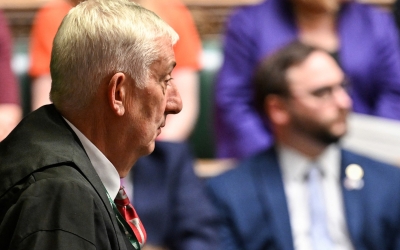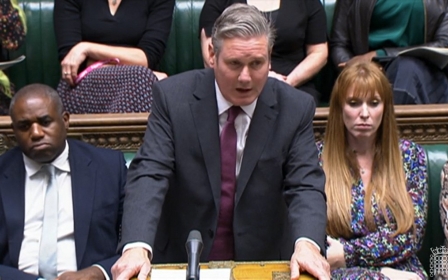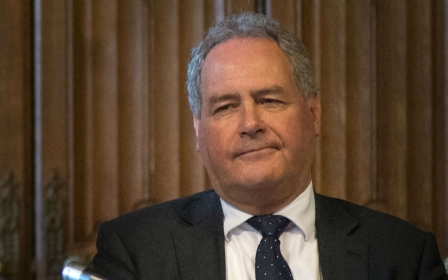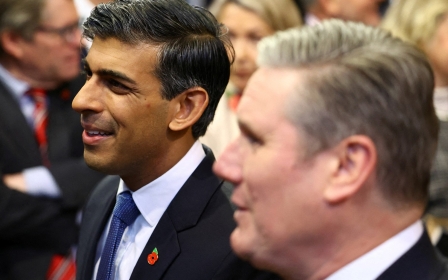War on Gaza: The real extremists in the UK are the politicians
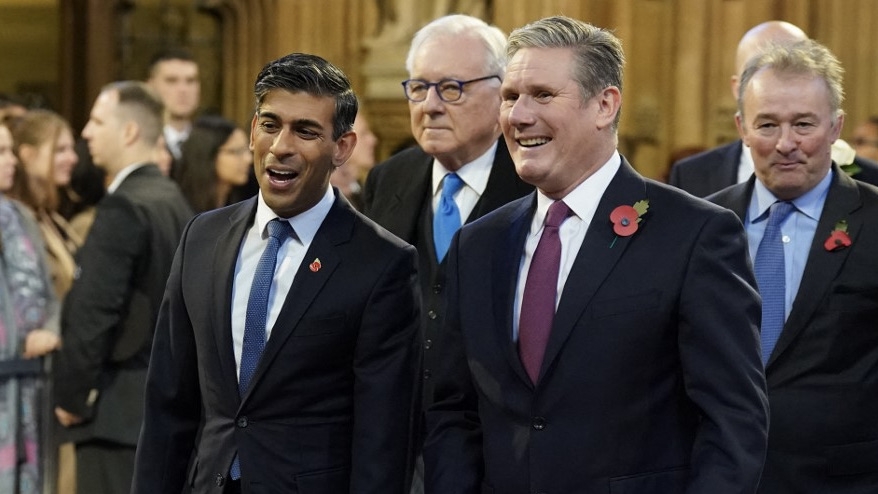
In 1912, Viscount Helmsley, destined to die along with countless others on the western front in the First World War, became the first MP to use the term "extremist" in the British parliament.
He used the term to warn against suffragettes - women who wanted the right to vote.
A few years later, women won that right, and politicians soon ceased to use the term extremist in connection with supporters of female emancipation.
Instead, as I discovered while researching my book Fate of Abraham: Why The West is Wrong about Islam, Britain’s political and media class started to apply the term to those who backed Indian independence.
It's easy to see what was going on here.
New MEE newsletter: Jerusalem Dispatch
Sign up to get the latest insights and analysis on Israel-Palestine, alongside Turkey Unpacked and other MEE newsletters
The term extremist was being exploited as a rhetorical device to make the case that Emmeline Pankhurst’s suffragettes or supporters of Mahatma Gandhi’s Congress Party were far beyond the range of accepted opinion.
They could therefore be ostracised or ignored, mocked and smeared in the media, criminalised and jailed.
'Hijacked'
Today, Gandhi is universally regarded as one of the greatest statesmen of the 20th century, while the opponents of Indian independence are seen as the real extremists.
The great struggle of Emmeline Pankhurst and her formidable daughter, Christabel, has been acknowledged with a memorial outside the Houses of Parliament, while those who traduced them as extremists are either forgotten or despised.
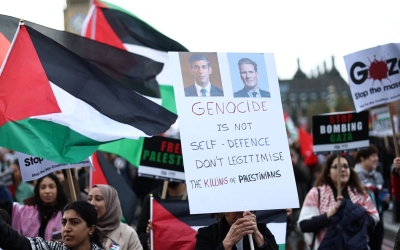
These days it’s British Muslims who have been singled out as extremists by politicians and the client media. And in recent weeks one particular group of Muslims in particular has been demonised, with campaigners for a ceasefire in Gaza pilloried in parliament and smeared in the press.
Prime Minister Rishi Sunak, in his statement outside Downing Street last week, warned that the protests over Gaza were "tearing us apart", adding that Britain’s streets had been "hijacked" by violent extremists calling for jihad.
He has ordered Communities Secretary Michael Gove to produce a new definition of extremism. According to a briefing in the Times, the newspaper for which Gove used to work, “a new government unit for combating extremism” will be set up to “assess whether the definition has been breached”.
Groups and individuals designated as extremist are barred from receiving government and council funding - and barred from working with public bodies.
Meanwhile, Lord Walney, government adviser on political violence, has indicated that the Palestinian Solidarity Campaign will be one of the main targets of the new regime.
As night follows day, the British media has rallied behind Sunak, Gove and Walney. Labour leader Keir Starmer was even quicker to praise the prime minister’s latest intervention.
Shame and horror
Let’s pause for a moment, take a step back and ask how historians are likely to interpret the terrible events of the last few months.
Will they praise Sunak’s decision to give his "unequivocal" support to Benjamin Netanyahu’s Israel on the eve of the onslaught on Gaza?
Will they view Sunak’s decision to suspend funds to Unrwa, the only organisation capable of delivering urgently needed humanitarian aid to starving Palestinians, as the act of a "moderate" British prime minister?
How will they judge Sunak's decision to carry on providing military support to Israel in the face of the International Court of Justice ruling that there are plausible grounds that Israel is committing a genocide in Gaza?
What will they think of the latest Downing Street-inspired smear campaign against Palestinian protest marchers? And what judgment will history deliver on Starmer’s support, uttered early in the war and repeated by shadow cabinet colleagues, for collective punishment of Gaza, including denial of water and electricity?
Open Democracy reported in early February that arrests at pro-Palestine marches were at a lower rate than at the Glastonbury music festival last year
I am not Nostradamus, but my guess is that future generations will look back with shame and horror at the thought that the leaders of our two major political parties could ever have thrown their weight behind Netanyahu. And feel bemused disbelief that a British prime minister could have suspended aid to Gaza as the besieged enclave faced famine.
As with the suffragettes and Indian independence, history is likely to judge that the real extremists are not - as Sunak asserts - the Palestinian Solidarity Campaign, which has organised a series of remarkably peaceful marches up and down Britain.
I am coming to believe that the real extremists can be found in Downing Street, the Conservative Party, and in Starmer’s Labour Party.
Note that Open Democracy reported in early February that arrests at pro-Palestine marches were at a lower rate than at the Glastonbury music festival last year.
Between October and December (when millions protested), there were only 153 arrests at the protests, with 117 of the arrestees released without charge. Yet the government is portraying the protests as a “mob” and an extremist threat.
Banned from Britain
You don’t have to wait for the verdict of history to feel serious doubts about the good faith of Sunak’s attack on what he called the “forces here at home trying to tear us apart”.
In an attempt at even-handedness, Sunak said on Friday that Islamists and far-right extremists are two sides of the same coin and both pose a threat to British democracy. But what does the government consider far right?
Apparently not former Home Secretary Suella Braverman saying “Islamists are in charge of Britain now”.
When Lee Anderson MP, a former deputy chairman of the Conservative Party, recently declared that London Mayor Sadiq Khan was under the control of Islamists, Sunak could not bring himself to describe the comment as Islamophobic or racist - let alone extremist.
Last week, Paul Scully MP repeated the far-right conspiracy theory that parts of London and Birmingham were “no-go areas” for non-Muslims. There’s no sign of Scully being condemned as an extremist.
Moreover, the Times reported on 3 March that “the Home Office is drawing up a list of foreign extremist preachers who will be banned from entry into Britain”.
No prizes for guessing which kind of preachers the government has in mind - “it is understood that officials will be asked to identify figures from countries including Pakistan and Indonesia to add to a warning list” - a Muslim-majority country in south Asia and a Muslim-majority country in southeast Asia.
Yet in 2017, Tory MP Bob Blackman came under fire for hosting Tapan Ghosh in the House of Commons.
Ghosh is a Hindu nationalist who has called for the UN to control the Muslim birth rate and praised the genocide of Rohingya Muslims. Blackman said he had been unaware of Ghosh’s remarks.
'Trojan Horse' conspiracy theory
Last year, Sunak associated himself with Morari Bapu, an influential Hindu preacher linked to the construction of the Ayodhya temple, where a historic 16th-century mosque, the Babri Masjid, stood until 6 December 1992 when a Hindu nationalist mob destroyed it.
The demolition of the mosque was accompanied by riots that killed nearly 2,000 people.
Extremism cannot be objectively defined, but in the hands of an unscrupulous government it does possess a spurious credibility which enables it to be cynically used as a weapon
Sunak made a surprise visit to Cambridge University’s Jesus College in August 2023, which was hosting a Hindu ceremony led by the preacher.
"It is truly an honour and pleasure to be here today at Morari Bapu's Ram Katha at the University of Cambridge on Indian Independence Day. Bapu, I am here today not as a prime minister but as a Hindu," Sunak said at the event.
And why is Michael Gove being allowed to conduct the Whitehall review of extremism? It is very hard to think of anyone less appropriate.
As education secretary 10 years ago, Gove set in motion the now discredited Islamophobic “Trojan Horse” conspiracy theory that "Islamists" were plotting to take control of Birmingham schools.
Extremism cannot be objectively defined, but in the hands of an unscrupulous government, it does possess a spurious credibility, which enables it to be cynically used as a weapon against whatever group happens to be most unpopular at any given moment.
This week the Palestinian Solidarity Campaign marches once more. It is Sunak’s Conservatives, and not the PSC, which poses the real threat to British social cohesion.
The views expressed in this article belong to the author and do not necessarily reflect the editorial policy of Middle East Eye.
Middle East Eye delivers independent and unrivalled coverage and analysis of the Middle East, North Africa and beyond. To learn more about republishing this content and the associated fees, please fill out this form. More about MEE can be found here.



